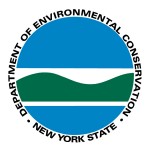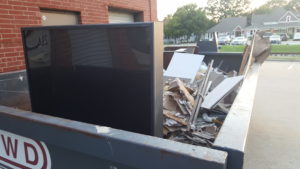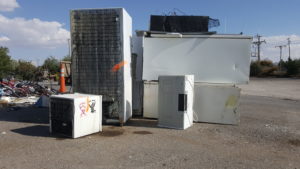As of January 1, 2015, consumers in state of New York may no longer dispose of certain types of electronic equipment in landfills, waste-to-energy facilities, in the trash, or at curbside for trash pickup. The following electronic equipment is covered by the NYS Electronic Equipment Recycling and Reuse Act and is therefore referred to as CCE or covered electronic equipment.
1, 2015, consumers in state of New York may no longer dispose of certain types of electronic equipment in landfills, waste-to-energy facilities, in the trash, or at curbside for trash pickup. The following electronic equipment is covered by the NYS Electronic Equipment Recycling and Reuse Act and is therefore referred to as CCE or covered electronic equipment.
Electronic Equipment Covered by the Law:
- Computers (including laptops, desktops, tablets and e-readers)
- Televisions
- Cathode ray tubes
- Computer peripherals (including any cable, cord, or wiring accompanying the computer peripheral.)
- Monitors
- Electronic keyboards
- Electronic mice or similar pointing devices
- Facsimile machines, document scanners, and printers (only those intended for use with a computer and weighing less than 100 lbs.)
- Small electronic equipment (including any cable, cord, or wiring accompanying the small electronic equip

e-waste is forbidden in trash or landfill disposal in many states ment.)
- VCRs
- Digital video recorders (DVRs)
- Portable digital music players
- DVD players (including projectors with DVD player capabilities intended for home-use)
- Digital converter boxes
- Cable or satellite receivers (including digital media receivers)
- Electronic or video game consoles (including both handheld devices and those intended for use with a video display device)
- Small scale servers
If you are unsure if your electronic device is covered by this law, please contact DEC @ (518) 402-8706 or ewaste@dec.ny.gov |
Covered electronic equipment does not include:
- Any motor vehicle or any part thereof
- Camera or video camera
- Portable or stationary radio
- Household appliances:

Most state regulations do not consider large home appliances to be e-Waste - Clothes washers
- Clothes dryers
- Refrigerators
- Freezers
- Microwave ovens
- Ovens and ranges
- Dishwashers
- Equipment that is functionally or physically part of a larger piece of equipment intended for use in an industrial, research and development or commercial setting
- Security or anti-terrorism equipment
- Monitoring and control instrument or system
- Thermostat
- Hand-held transceiver
- Telephone of any type
- Portable digital assistant or similar device
- Calculator
- Global positioning system (GPS) receiver or similar navigation device
- A server other than a small-scale server
- A cash register or retail self checkout system
- A stand-alone storage product intended for use in industrial, research and development or commercial settings
- Commercial medical equipment that contains within it a cathode ray tube, a flat panel display or similar video display device, and is not separate from the larger piece of equipment
- Other medical devices as that term is defined under the Federal Food, Drug and Cosmetic Act.
If you are unsure if your electronic device is covered by this law, please contact DEC @ (518) 402-8706 or ewaste@dec.ny.gov |
How Do I Recycle My Electronics?
Under the NYS Electronic Equipment Recycling and Reuse Act, manufacturers are required to provide consumers a free and convenient opportunity to recycle their equipment or one piece of CCE from another manufacturer with the purchase of the same type.
Depending on a specific manufacturer’s acceptance program, CCE recycling opportunities may include:
- Mail back programs
- Local collection events
- Permanent collection locations (PDF)
- Free at-home pickup, when no other free and convenient option is available
Visit DEC’s website for more information on recycling consumer electronic waste.
This video from NYC ZeroWaste describes e-waste recycling options for citizens of NYC
Contact me with any questions you may have about the generation, identification, management, and disposal of hazardous waste Daniels Training Services, Inc. 815.821.1550 |



